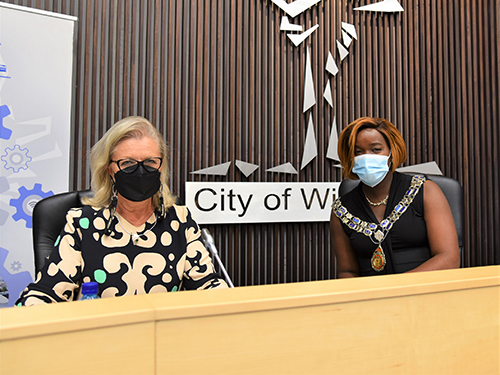Staff Reporter
During a virtual ceremony on Monday, 31 January 2022, City of Windhoek mayor Sade Gawanas signed an agreement with her counterpart from the City of Bremen, mayor Andreas Bovenschulte, to implement a European Union-funded project to improve solid waste management in Windhoek. The European Union–Directorate General for International Cooperation and Development (DEVCO) will fund the four-year project to the tune of N$36.8 million (or 2.125 million Euros at the current exchange rate).
Recent studies indicate that Windhoek’s population has been growing rapidly over the last decade due to urbanisation and increased economic activity. However, many new residents are living in informal neighbourhoods without adequate water supply and sanitation facilities. These unsanitary living conditions contribute to the spread of diseases, affecting already disadvantaged and marginalised groups of the population. The City of Windhoek has set a goal for itself of improving living conditions in these neighbourhoods.
The main objective of the new project is to reduce waste volumes and harmful environmental impacts, and thus to expand the share of recycled waste, along with creating jobs through innovative start-ups in Windhoek’s circular economy.
Overall, in the coming months, there will be several exchanges (job-sharing) between waste management experts of the City of Bremen and Windhoek. Moreover, workshops and educational measures for school children will be arranged in Windhoek, while recycling stations will be established. As a further measure, an incubator for startups in the circular economic sector will be set up in Windhoek, therein enabling young people to test new and innovative business ideas and to fulfill their dream of establishing their own businesses.
Gawanas was full of joy following the signing of the agreement that will facilitate the achievement of the capital city’s ambitious targets on recycling, packaging waste, landfills and solid waste management. “On behalf of the city, we are grateful for this partnership with the City of Bremen that will improve the quality of lives of our citizens while creating much-needed job opportunities. We are confident that this project will promote the shift towards a more sustainable model known as the circular economy for Windhoek and Namibia as a whole,” she enthused.
Meanwhile, Bovenschulte expressed his delight for this project to his counterpart in Windhoek. “Bremen is committed to the development goals of the United Nations. This project is contributing towards the implementation of these goals, and directly benefits the people in our twin city”, he added.
Head of the EU delegation to Namibia, Sinikka Antila, was also present during Monday’s ceremony. She congratulated the two cities represented by their mayors for signing the solid waste management agreement, adding that the provision of high-quality solid waste management is in line with the EU’s sector policy objectives and Sustainable Development Goals (SDGs) to safeguard public health and the protection of the environment.
“We are proud to be funding this programme as it directly addresses some of the most pressing needs of Windhoek residents. The real work starts now to make this programme a resounding success”, Antilla observed.
The City of Bremen has been on friendly terms with Namibia, and in particular with Windhoek, for over 40 years. In 2000, representatives of the two cities signed an agreement to jointly implement Local Agenda 21. In partnership with the German Federal Ministry for Economic Cooperation and Development (BMZ) and the Deutsche Gesellschaft für Internationale Zusammenarbeit (GIZ), joint projects have since then been carried out on the topics of vocational training, sustainable mobility and wastewater disposal.
Since October 2017, Windhoek and Bremen have been working together on a climate partnership, supported by the BMZ. As part of this programme, exchanges of municipal experts from both cities have taken place several times on topics such as waste management, wastewater management, sustainable tourism and environmental education.


